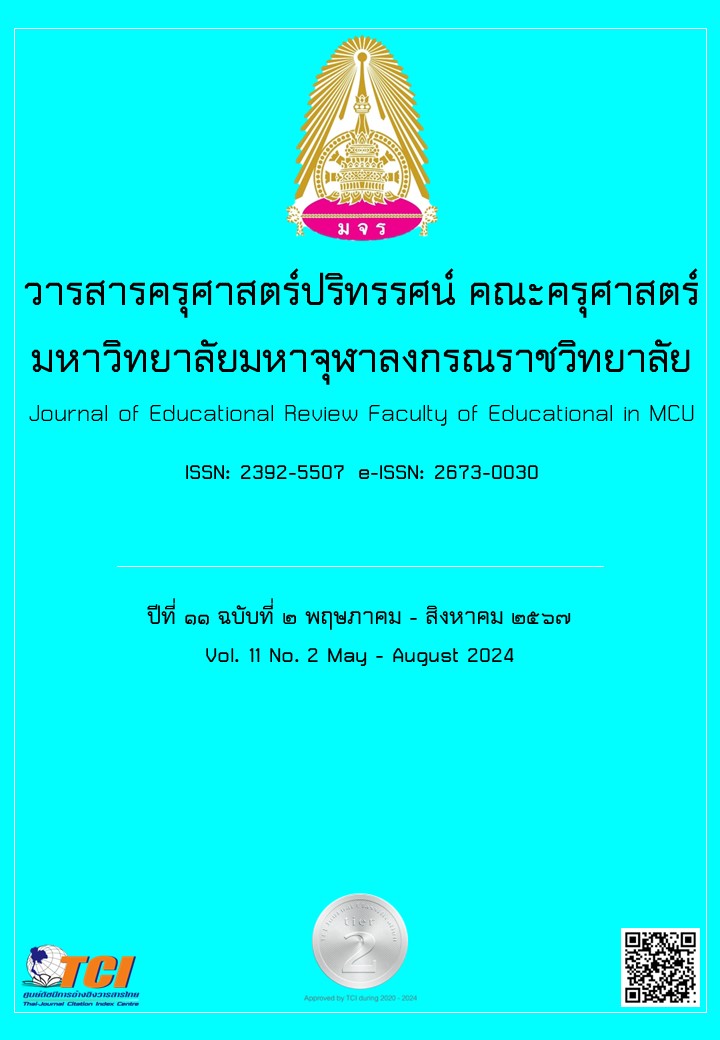หลักอิทธิบาท 4 : หลักพุทธธรรมในการบริหารสถานศึกษาสมรรถนะสูง
Main Article Content
บทคัดย่อ
การบริหารสถานศึกษาสมรรถนะสูง เพื่อพัฒนาคนในทุกมิติ และทุกช่วงวัยให้เป็นคนดี เก่ง และมีคุณภาพ เนื่องจากตามยุทธศาสตร์ชาติ 20 ปี (พ.ศ. 2561 - 2580) ได้กำหนดเป้าหมายการพัฒนาทุกมิติ และทุกช่วงวัยให้เป็นคนดี เก่ง และมีคุณภาพ สร้างโอกาสและความเสมอภาคทางสังคม โดยมุ่งเน้นการยกระดับคุณภาพของครูและบุคลากรทางการศึกษา พัฒนาหลักสูตรและการเรียนการสอนที่ทันสมัย ส่งเสริมการเรียนรู้ตลอดชีวิต สร้างการเติบโตบนคุณภาพชีวิต ที่แผนแม่บทภายใต้ยุทธศาสตร์ชาติและแผนปฏิรูปประเทศด้านการศึกษา มีแนวทางการพัฒนาการสมรรถนะและคุณลักษณะที่ดีสมวัยทุกด้าน มีการปฏิรูปการเรียนรู้สำหรับศตวรรษที่ 21 ปรับบทบาทครูให้เป็นครูยุคใหม่ เพิ่มประสิทธิภาพระบบบริหารจัดการศึกษาในทุกระดับ การบริหารสถานศึกษามีเป้าหมายที่ชัดเจนและมุ่งมั่นที่จะบรรลุเป้าหมายนั้น มีการทำงานอย่างมีประสิทธิภาพและประสิทธิผลในการบริหารสถานศึกษาที่มีคุณธรรมและจริยธรรมที่สูง มีวิสัยทัศน์ที่ชัดเจน และมุ่งมั่นที่จะพัฒนาสถานศึกษาให้มีคุณภาพ มีความรู้และความเข้าใจเกี่ยวกับการบริหารจัดการสถานศึกษาอย่างรอบด้าน จัดให้มีหลักสูตรการพัฒนาครูที่มีคุณภาพ ส่งเสริมให้ครูได้พัฒนาตนเองอย่างต่อเนื่อง กระบวนการทำงานให้เหมาะสมกับสถานการณ์และความต้องการของผู้มีส่วนได้ส่วนเสีย ดังนั้นบุคลากรที่มีสมรรถนะสูงเป็นบุคคลที่มีความรู้มีความสามารถมีศักยภาพในการปฏิบัติงาน ส่งผลให้เป็นบุคคลากรที่มีคุณภาพและมีคุณธรรม
หลักพุทธธรรมที่นำมาบูรณาการกับการบริหารสถานศึกษาสมรรถนะสูง คือ หลักอิทธิบาท 4 เป็นหลักธรรมในพระพุทธศาสนา หมายถึง ฐานหรือหนทางสู่ความสำเร็จ หรือ เครื่องมือให้ถึงความสำเร็จ เครื่องมือให้สำเร็จสมประสงค์ ทางแห่งความสำเร็จ คุณธรรมที่นำไปสู่ความสำเร็จแห่งผลที่มุ่งหมาย มี 4 ประการ ประกอบด้วยฉันทะ (ความพอใจ) วิริยะ (ความเพียร) จิตตะ (ความเอาใจใส่) และวิมังสา (การใช้ปัญญาพิจารณา) หลักธรรมเหล่านี้สามารถนำไปประยุกต์ใช้ในการบริหารสถานศึกษาได้โดยผู้บริหารสถานศึกษาที่ยึดหลักอิทธิบาท 4 จะเป็นผู้ที่มีความพร้อมในทุกด้าน ทั้งด้านจิตใจ ด้านความคิด และด้านการกระทำ ซึ่งจะส่งผลให้การบริหารสถานศึกษาประสบความสำเร็จตามเป้าหมาย
Article Details

อนุญาตภายใต้เงื่อนไข Creative Commons Attribution-NonCommercial-NoDerivatives 4.0 International License.
ทัศนะและความคิดเห็นที่ปรากฏในบทความในวารสารฉบับนี้ถือเป็นความรับผิดชอบของผู้เขียนบทความนั้นเพียงผู้เดียว และไม่ถือเป็นทัศนะและความรับผิดชอบของกองบรรณาธิการ
กองบรรณาธิการขอสงวนสิทธิ์ในการคัดเลือกบทความลงตีพิมพ์และจะแจ้งให้เจ้าของบทความทราบหลังจากผู้ประเมินบทความตรวจอ่านบทความแล้ว
ต้นฉบับที่ได้รับการตีพิมพ์ในวารสารครุศาสตร์ปริทรรศน์ คณะครุศาสตร์ มหาวิทยาลัยมหาจุฬาลงกรณราชวิทยาลัย ถือเป็นกรรมสิทธิ์ของคณะครุศาสตร์ มหาวิทยาลัยมหาจุฬาลงกรณราชวิทยาลัย ห้ามนำข้อความทั้งหมดหรือบางส่วนไปพิมพ์ซ้ำ เว้นเสียแต่ว่าจะได้รับอนุญาตจากมหาวิทยาลัยฯ เป็นลายลักษณ์อักษร
เอกสารอ้างอิง
กระทรวงศึกษาธิการ. (2558). แนวทางการจัดการเรียนรู้ในศตวรรษที่ 21. กรุงเทพมหานคร: กระทรวงศึกษาธิการ.
กระทรวงศึกษาธิการ. (2562). แนวทางการยกระดับสถานศึกษาสู่ความเป็นเลิศ. กรุงเทพมหานคร: โรงพิมพ์รุ่งศิลป์.
กระทรวงศึกษาธิการ. (2564). คู่มือการพัฒนาผู้บริหารสถานศึกษา. กรุงเทพมหานคร: กระทรวงศึกษาธิการ.
พระพรหมคุณาภรณ์ (ป. อ. ปยุตโต). (2549). พุทธธรรม ฉบับปรับปรุงและขยายความ. พิมพ์ครั้งที่ 11. กรุงเทพมหานคร: สหธรรมิก.
มหาจุฬาลงกรณราชวิทยาลัย. (2559). พระไตรปิฎกภาษาไทย ฉบับมหาจุฬาลงกรณราชวิทยาลัย. กรุงเทพมหานคร: มหาจุฬาลงกรณราชวิทยาลัย.
ว.วชิรเมธี. (2551). คนสำราญ งานสำเร็จ. พิมพ์ครั้งที่ 14. กรุงเทพมหานคร: สำนักพิมพ์อมรินทร์.
สมคิด สกุลสถาปัตย์. (2564). การบริหารจัดการสถานศึกษาขั้นพื้นฐานสู่องค์การสมรรถนะสูงโดยใช้พลังร่วมเป็นฐาน. วารสารบัณฑิตศึกษา มหาวิทยาลัยกรุงเทพธนบุรี. 12(2). 1-18.
สำนักงานเลขาธิการสภาการศึกษา. (2564). รายงานการศึกษาไทย พ.ศ. 2564 -2566. กรุงเทพมหานคร: สำนักงานเลขาธิการสภาการศึกษา.


